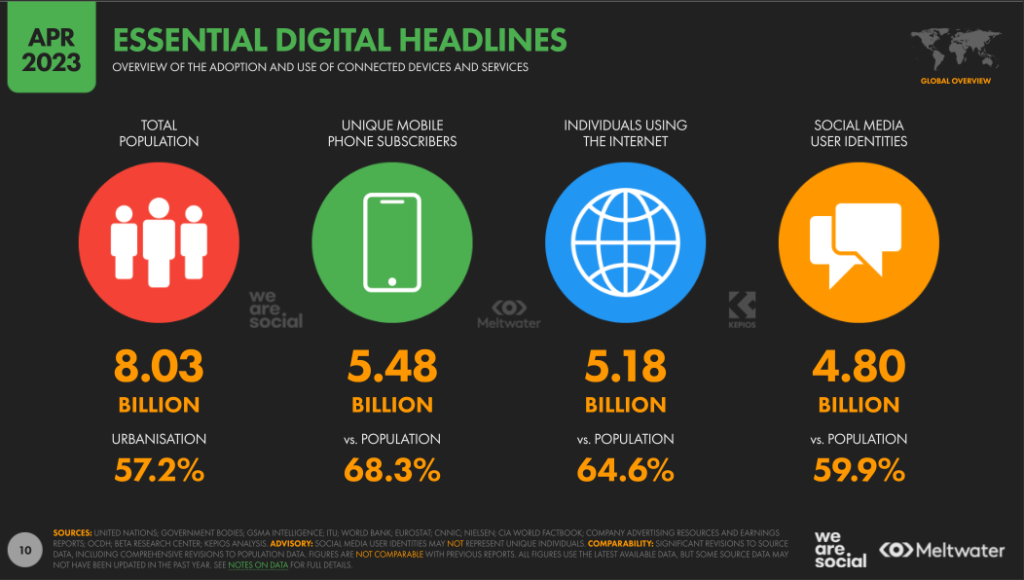Social media has power. But do the social media activities affect your brand SEO (Search Engine Optimization) in any way? The world population is at 8 billion as we speak today, and it keeps growing. The digital has also transformed how we communicate, engage, do business and network with people across the globe. This is the exact reason to why social media has become an integral part of our lives. According to the current digital statistics by Digital 2023 April Global Statshot Report, there are 5.18 Billion internet users and at least 4.8 Billion on social media.

As businesses strive to establish their online presence and improve their visibility, the relationship between social media and your brand SEO (Search Engine Optimization) has garnered significant attention.
SEO, the practice of optimizing websites to rank higher in search engine results, has traditionally relied on factors such as website structure, keyword optimization and backlinks. However, the rise of social media has introduced new dynamics into the SEO landscape. Social media platforms, with their massive user bases and engagement-driven environments, have the potential to influence website visibility and online reputation.
Let’s explore the multifaceted ways social media activity can impact your SEO strategy and ultimately contribute to the success of your online endeavors.
1. Your Engagement Determines Your Visibility
Social media platforms are search engines on their own. That’s why we can easily come across viral content on the platforms we engage people one. There’s a reason to that. More interactivity on our social media content means that people love or like what you share or in some way influenced to react to your opinions. Social media SEO depends on the rate of engagement and interactivity to push your content more to other people.
When your content receives social media engagement, it can attract more attention and increase visibility. This can potentially lead to more organic backlinks or citations from other websites hence create a positive impact on your brand SEO. Have you see blog posts with embedded social media links?
2. Your Consistency on Social Media
Search engines regularly crawl social media platforms, indexing their content in search results. By consistently posting and sharing content on social media, you increase the chances of your content being indexed and potentially displayed in search engine results pages. This can lead to increased visibility and organic traffic to your website.
I am active and consistent on Twitter. Let’s see if I can fins some of my Twitter content upon searching my name on Google.
Consistent use of social media can lead to your social media profiles showing up on Search when people are searching information using particular keywords. This increases your content visibility and interactions.
3. Your Influence, Authority and Following
Does the number of followers you have really affect your brand SEO? This is a two edged sword question with two answers, DIRECTLY, NO and INDIRECTLY, YES. How?
DIRECTLY NO: Search engines such Google do not consider the quantity of followers or following on social media platforms as a direct ranking factor for websites.
However, the number of followers on social media indirectly influence brand SEO and this is how that happens:
a) Social proof and credibility: When users see that your social media profiles have a significant following, it can create a perception of popularity and authority. This can influence user behavior, engagement, and potentially lead to increased website traffic and brand mentions, which can indirectly benefit your SEO.
b) Amplification of content: When you have a large social media audience and you share valuable and engaging content, it may be shared by your followers, leading to increased visibility and potential referral traffic to your website. This amplification can indirectly contribute to your SEO efforts by improving brand visibility and generating potential backlinks from other websites. Article Sponsored Find something for everyone in our collection of colourful, bright and stylish socks. Buy individually or in bundles to add color to your drawer!
A very good example is my Twitter account. This is my profile. Firstly, l have over 200,000 followers. I am also a thought leader in the digital marketing industry. Social media authority comes with influence and engagements.
c) Thought leadership: Thought leaders are trusted individuals due to their experience and expertise in the industry they represent. I am a thought leader and in most cases I am requested to share my expert insights in industry reports, articles and conversations such as Marketing Trends to Expect in 2024. Brands such as Talkwalker will have our names and profiles featured on their blogs and websites to give us more visibility, credibility and authority which can ultimately build on our personal brand SEO.
4. Social Media Platforms are Becoming Search Engines
While older internet users mind find it hard to use social media to find places, search for people and products, the younger generation is work and armed with skills. The tech skills are helping them to use social media search engines. Look at what this led to (see tweet below).
Nowadays, social media people make the news. One can become a source of information where the tweets, facebook and instagram posts are embedded to blogs as a reference. People are searching more on social media than on search engines. This has led to search engines giving social media content priority. For example, if you search for particular keywords on Google, be it for a video, you might get TikTok and Twitter search results.
Key Takeaway
At the end of the day, consistency is key when it comes to social media activity and SEO. Regularly posting high-quality content, engaging with your audience, and maintaining an active presence on social media can contribute to improved brand SEO performance by enhancing brand visibility, generating engagement and backlinks, and signaling credibility to search engines.










One Response